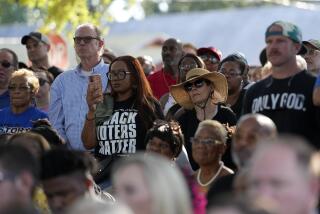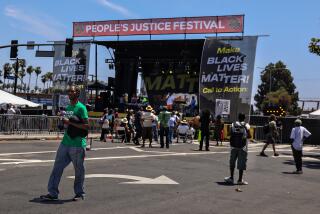Michael Brown funeral: Mourners told to turn anger into action
Reporting from St. Louis — When the Rev. Al Sharpton called on mourners at the funeral for Michael Brown to begin a nationwide drive for change, Camille Foster thrust her right hand high and leapt from the church pew to her feet.
“Yes, sir! Yes, sir!” Foster, 22, belted out Monday as the funeral for Brown, an unarmed black man shot by a white police officer, soared into a national lament over race and justice and the number of young African American men who have died in cities like Ferguson.
As with any funeral, there were tears and heart-wrenching images as more than 2,500 people packed the Friendly Temple Missionary Baptist Church to remember Brown, who was killed Aug. 9.
Brown’s mother, Lesley McSpadden, stood as if in shock, staring at her son’s casket and shaking her head back and forth as a tear rolled down a cheek. Brown’s cousin, Bernard Ewing, choked back tears as he spoke of his young relative.
“I love you, Mike. That’s all I’ve got to say,” Ewing said, standing on a stage behind a casket laden with red roses and a St. Louis Cardinals baseball cap.
A memorial that ordinarily would have included family and friends from the small suburb of Ferguson where Brown lived and died drew attendees from across the country.
There were Hollywood celebrities: Spike Lee, Wesley Snipes and MC Hammer. There were the still-aggrieved relatives of the victims of earlier confrontations with people who viewed them as threats: Oscar Grant, Trayvon Martin, Emmett Till.
And there were flocks of people who drove and flew in from across the country, most of them black but a few of them white, hoping to be part of a day that many believed would be written in the history of race in America.
“A lot of people feel they could be next,” said Chris Gray, 29, who came from Minneapolis. “There’s a historic possibility here for young people to take ownership of a new civil rights movement.”
Sharpton’s message to the crowd gathered inside the church, in overflow rooms and outside in the searing heat was that Brown’s death must mark the beginning of a change, not only in the justice system but in the role African Americans play in making it happen.
“Nobody is going to help us if we don’t help ourselves,” said Sharpton, challenging listeners to stop “sitting around having ghetto pity parties.”
“We can’t have a fit. We’ve got to have a movement,” he bellowed from the pulpit, criticizing protesters who looted stores in demonstrations after Brown’s death. “A fit — you get mad and run out for a couple of nights. A movement means we’ve got to be here for the long haul and turn our chance into change, our demonstration into legislation.”
Other speakers in the nearly three-hour service echoed his call, making pointed comments about the need to vote, an issue that is at the heart of the racial imbalance in Ferguson. About 14,000 of the city’s 21,000 residents are black, but the City Council and police department are overwhelmingly white. In the last municipal election, voter turnout was 12.3%, a number Sharpton has called “an insult.”
It was a message that resonated with the listeners.
“We love you!” they shouted at McSpadden, who stared straight ahead throughout the service, rocking slightly back and forth and clutching a handkerchief.
DeeNa Adair, 41, came to the funeral with her husband and 10-month-old grandson, Zion, after taking part in protests last week in Ferguson.
“If we don’t stand up now, what is his future?” she said of Zion. Adair said she had lost a 20-year-old son to gun violence in downtown St. Louis.
“Hopefully … this is what sparks the nation to change, to deal with the racial divide,” Adair said.
Martina Primus, 33, of nearby Jennings was there with her 2-year-old and 3-year-old sons.
“I’ve got these two young boys to look after,” she said. “This is a wake-up call for our young black men. I don’t want them to be victims.”
Mourners came from as far as California and Canada to watch the service, which alternated between being politically stirring, somber and uplifting as a choir belted out gospel songs and women pounded tambourines and shook maracas. Men, women and children, dressed in starched suits and elaborate dresses, swayed in unison, danced and held their hands toward the sky.
For all the cries for an end to racism and equal justice, one thing missing was white faces, which numbered only a handful.
Perhaps that was a reflection of nationwide attitudes toward policing, which were outlined in a survey released Monday by the Pew Research Center and USA Today. The survey, conducted after Brown’s killing, found that whites were far more likely than blacks to feel confident that police will treat people of both races equally.
It found that 46% of blacks have “very little” confidence in police to treat blacks and whites equally, compared with 12% of whites.
That distrust was evident among mourners.
“They think because they wear a badge, they hold life in their hands,” said Demond Wright, 23, a dishwasher from Ferguson.
“The reality is, this is happening all over the country — the criminalization of young black men, stop and frisk. It’s spreading,” said Nate Parker, 34, an actor and producer from Pasadena. He flew to Missouri after realizing he had no answer for his 17-year-old nephew, who asked him what he should do if stopped by police.
Parker noted that two days after Brown was shot, a mentally ill black man was shot and killed by police in South Los Angeles.
“The real question is how many days will pass before another unarmed black man is killed?” Parker said.
Nobody has been charged in Brown’s death, and it could be mid-October before the grand jury hearing evidence in the case decides whether there is sufficient evidence to indict the officer who shot him, Darren Wilson.
Authorities say Wilson, 28, who has been a police officer for six years, fired in self-defense after Brown attacked him. Some witnesses say Wilson was the aggressor and shot Brown after ordering him to stop walking down the middle of the street where he lived.
Eric Harris, 18, who lives in St. Louis, did not know Brown, but he soaked in Monday’s funeral with a keen awareness.
“I’m the same age as him. It could be me,” said Harris, who said his interactions with police had been limited because he was “not acting up” in the streets.
“But you don’t have to be acting up to be targeted,” he said. “You can just be walking home from the store and bang, you’re a target.”
More to Read
Sign up for Essential California
The most important California stories and recommendations in your inbox every morning.
You may occasionally receive promotional content from the Los Angeles Times.













